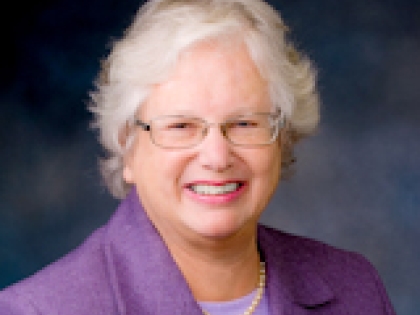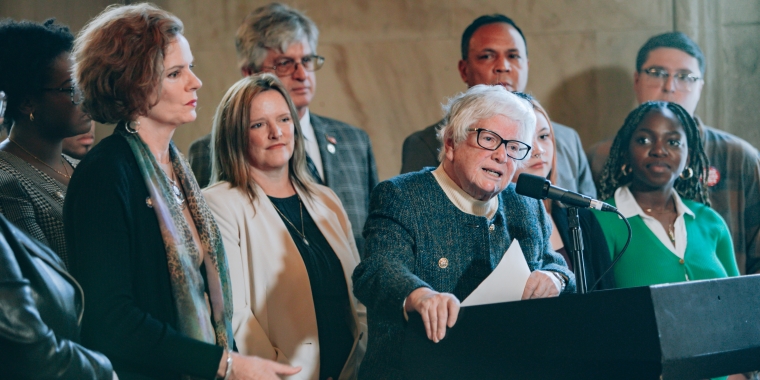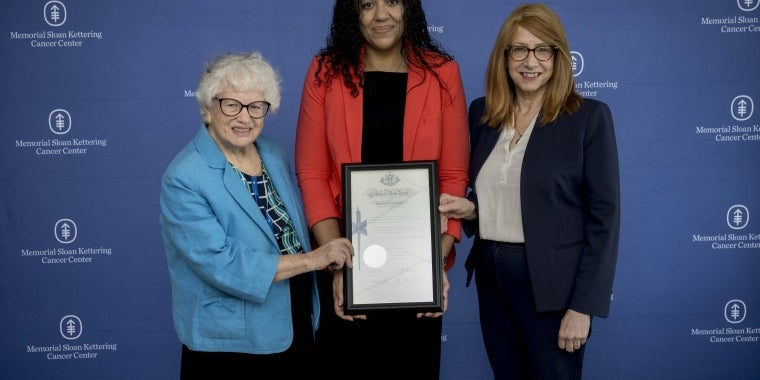
Senate and Assembly Higher Education Committees Launch #TurnOnTheTAP Campaign and Call for New Era for Higher Ed. in New York
January 8, 2024

Senator Stavisky Speaks at #TurnOnTheTAP Press Event
ALBANY, NY (Jan. 8) – On the eve of Governor Hochul’s State of the State address, Chairs of the Higher Education Committees in the New York State Legislature, Senator Toby Ann Stavisky and Assemblymember Patricia Fahy, announced a package of legislation to #TurnOnTheTAP and make critical investments in operating aid for the SUNY and CUNY systems. The proposed package of bills raises TAP’s income thresholds, award amounts, and expands the number of students eligible for TAP. On its 50th anniversary, lawmakers also urged an increase in funding, as TAP funding in FY2010 was the equivalent of $1.3 billion in today’s dollars, yet in FY2024, TAP was funded at $897 million–a net decrease of $403 million in 2023 dollars over the last 13 years.
Furthermore, TAP utilization has declined by more than 15% since 2017, from 278,000 recipients in 2017-2018 to 234,000 recipients in 2022-2023 against a 9% drop in enrollment in that same period. In turn, TAP funding has not been increased to keep up with inflation. Prior to 2011, New York would increase the maximum TAP award to match the state’s public college tuition rate, until it was decoupled that same year. Since then, tuition growth has steadily outpaced increases in the maximum TAP award. In 2010, SUNY tuition was $4,970 for in-state residents, and the maximum TAP award was $5,000.
Today, SUNY tuition is more than $7,000, but the maximum TAP award has only been raised to $5,665. If the maximum TAP income threshold had kept pace with inflation, it would be $122,000. Instead, it has remained at $80,000, falling short by one-third of its modern-day value. At a time when more than 70% of students cite cost as a barrier to attending college, TAP’s funding has not kept pace with rising tuition, enrollment, inflation, and the growing cost of living, forcing students and families dependent upon TAP to shoulder a growing financial burden.
Lawmakers called on the state legislature and Governor to; raise the minimum TAP award to $1,000, raise the income threshold from $80,000 to $110,000 or $150,000, increase overall funding for TAP, and expand the definition of eligible students. Additionally, they urged a continuation of the increases secured last year in operating aid for SUNY and CUNY systems, to make critical investments that will help boost enrollment and ensure their fiscal health and longevity. This month, the Albany Times Union reported that SUNY projects a $1 billion deficit over the next 10-year period without significant investments. SUNY alone has a $28 billion annual economic impact in New York and for every dollar spent on SUNY, the state gets an $8.17 return on investment.
Finally, in light of the Supreme Court of the United States’ decisions on rolling back affirmative action and student debt relief, it is more important than ever that New York double down on efforts to improve college affordability for middle- and low-income students and families.
Pending TAP-related legislation before the higher education committee:
- A1094 Epstein (Same as S 5447 JACKSON) -- Expands TAP eligibility to graduate students and allows TAP to fund optional semesters, quarters, or terms (including summer sessions).
- A1179 Anderson (Same as S 347 GOUNARDES) – Increases the maximum years of TAP assistance to six, which is currently the maximum for Pell grants.
- A1889 Clark (Same as S 3474 STAVISKY) -- Increases the income eligibility threshold from $80,000 to $110,000.
- Not introduced -- Index income threshold to inflation.
- A2622 Hyndman (Same as S 2578 GOUNARDES) -- Increases the TAP income cap for independent students with no dependents to $30,000.
- A6713 Fahy (Same as S 7682 STAVISKY) – Increases the TAP income cap for single and married independent students with no dependents.
- A8089 Clark (No same as) -- Increases the minimum TAP award to $1,000.
- A5833 Hyndman (Same as S 6466 FERNANDEZ) -- Permits TAP awards to be made to part-time students enrolled in NY proprietary colleges.
- A1164-B Jacobson (Same as S 1983-A GOUNARDES) -- Creates a uniform presentation for students regarding FAFSA; directs students to complete an affidavit certifying that the student attended the presentation and stating whether the student intends to apply for financial aid. Passed Senate.
- A2154 Dinowitz (Same as S 2119 BAILEY) – Expands the veterans tuition awards program (VTAP), which is for Combat Veterans with Honorable Discharges, to allow the transfer of unused benefits to a spouse, survivor or child. Passed Senate.
- A7967 Cunningham (No same as) -- Increases the income eligibility threshold for the tuition assistance program to $150,000.
- A1185 McDonald (Same as S 4145 MANNION) -- Authorizes TAP awards for students enrolled in short-term credential programs offered by certain public institutions in high demand fields
- A1674 Hunter (No same as) -- Provides eligibility to Afghan and Iraqi immigrants who enter the US on a special immigrant, P-1, or P-2 visa.
- A4958 Kelles (No same as) -- Allows TAP awards to cover micro-credentialing programs.
- A8432 Fahy (No same as) – Relates to the criteria for determining tuition assistance program awards; provides for the elimination of the distinction between dependent students and independent students for the purpose of determining tuition assistance program award amounts and eligibility.
- A8433 Fahy (No same as) – Relates to increasing the phase-out threshold for tuition assistance program awards from seven thousand dollars to eighteen thousand dollars.
“It’s time to #TurnOnTheTAP and make college affordable again for New York’s students and families while investing in the future of SUNY and CUNY,” said Assembly Higher Education Chair Assemblymember Patricia Fahy. “New York’s Tuition Assistance Program is celebrating its 50th anniversary and catapults more than 200,000 New York students into their dream of attaining a higher education every academic year. Despite this success, TAP has failed to keep pace with tuition increases since 2011 and has seen its funding remain largely flat against a decrease of $400 million since 2007, in correlation with declining enrollment and students utilizing TAP. It’s time to bring TAP into the 21st Century and make college affordable again for middle- and low-income families. I look forward to working with my Higher Education counterpart and Chair, Senator Toby Ann Stavisky, and members of the higher education committees to usher in a new era for higher education in New York State this year.”
“New York’s Tuition Assistance Program (TAP) provides critical financial support for thousands of students, many of whom simply would not be able to attend college without it,” said Senate Higher Education Chair Senator Toby Ann Stavisky. “By ‘Turning on the TAP’ we will raise the funding award to keep up with inflation and expand the program to offer more students this needed aid. The burden of public higher education should not fall on the backs of middle-class families. New York State must do its part to make sure our higher education systems are leaders in quality, affordability, and accessibility.”
“As we celebrate fifty years of the Tuition Assistance Program, we must make sure it continues to serve students and families throughout New York,” said Chair of the Subcommittee on TAP, Assemblymember Sarah Clark. “Adjusting TAP eligibility and award amounts to keep up with tuition, fees and rising costs of living is imperative. As we see the number of students receiving TAP decline, the time is now to adjust this program, ensuring we open the door to higher education for more NYers. Today I join my colleagues in the Assembly and Senate as we push to #TurnOnTheTAP.”
“The Tuition Assistance Program (TAP) provides critical financial support to make sure more of our students have access to a high-quality education here in NY,” said Senator Lea Webb. “For too long, however, New York’s largest grant program has been flat. As TAP turns 50 this year, it is time to raise the minimum award from $500 to $1,000, putting college within reach for more students and easing the burden for working families.”
"The Tuition Assistance Program is a key tool for higher education affordability. This session, we must expand eligibility for TAP grants and ensure that more students in our State have access to an affordable college education.” said Senator Iwen Chu. “Let’s bring down barriers and continue to fight for our students because all students deserve to have access to an inclusive and affordable education."
"Maintaining a quality and affordable higher education system is vital to the future of our state,” said Assemblymember Monica Wallace. “Our universities produce the skilled workforce that employers rely on. They are also economic drivers of both our state and local communities, as demonstrated by the fact that every dollar invested in SUNY campuses generates more than eight-fold that amount in economic impact. To advance our economy and provide opportunities for all, we must restore TAP funding and increase aid to our crucial public universities."
“After 40 years as a teacher, the matter of education and its affordability is at the very top of my priorities,” said Assemblymember Christopher W. Eachus, 99th District. “To me, it’s simple - as one of the wealthiest states in the nation, our children deserve access to a world-class education. Today, our SUNY and CUNY systems are robust - but it’s becoming increasingly difficult for young adults of all backgrounds to access. I’m proud to be working alongside great leadership in Assemblymember Fahy and Senator Stavisky, who recognize this critical issue and the pathways to solving it. This year, I’m confident we will be fighting hard to lower costs, restore funding, and give increased affordability to a college education for all New Yorkers.”
“Accessible and affordable public education is integral to closing the opportunity gap, allowing folks to break generational barriers and lift themselves out of poverty” said Assembly Member Harvey Epstein. “In an increasingly unaffordable educational landscape, SUNY and CUNY schools must continue to provide students with a quality education at a reasonable price. My bill A1094 would expand TAP eligibility to graduate students and allow funds to be used for optional academic terms. Also, my bill A04465 would make folks experiencing homelessness eligible for TAP. I call on my colleagues to join the #TurnOnTheTAP campaign, and fight for New York students.”
“I commend Senator Stavisky and Assemblymember Fahy and my colleagues for collaborating to put forward the #TurnOnTheTap campaign,” said Assemblymember John T. McDonald, III. “Higher Education is the gateway to future success, yet the program is mired in its thresholds that date back to 1974. I often subscribed to the theory "If it ain't broke, don’t' fix it" however when it comes to TAP the theory is relatively simple - "It ain't broke, we need to fund it". The small investment, the raising of the thresholds and thoughtful expansion to capture today's students and employers’ needs will back dividends as we attract and retain more students to graduate and live in New York.”
“This year, we mark the 50th anniversary of the Tuition Assistance Program (TAP). TAP has helped over six million New Yorkers achieve their dream of a college degree. New York’s signature student aid program is unmatched in its simplicity, efficacy, and reach’ said CICU President Lola W. Brabham. She added, “Unfortunately, the program has stagnated in the last 20 years. New York’s TAP award is less than half of the maximum award in California and New Jersey, states with equally robust higher education sectors. TAP is crucial to ensuring that all students have the opportunity to attend and graduate from college. The CICU and our member campuses that comprise the Independent Sector applaud Assemblymember Fahy and Senator Stavisky for their leadership and are proud to be part of the #TurnOnTheTAP campaign to ensure that TAP continues to be transformational for millions of New York’s college students and their families.”
“The time is now to invest in the public higher education system of our state,” said Brad Herschenson, CWA-GSEU Legislative Coordinator. “Expansions to the TAP program, including graduate student support, invests in our students, union members, and the families across our state. We are committed to working with the legislature and advocates to strengthen this program and others.”
###
Share this Article or Press Release
Newsroom
Go to Newsroom